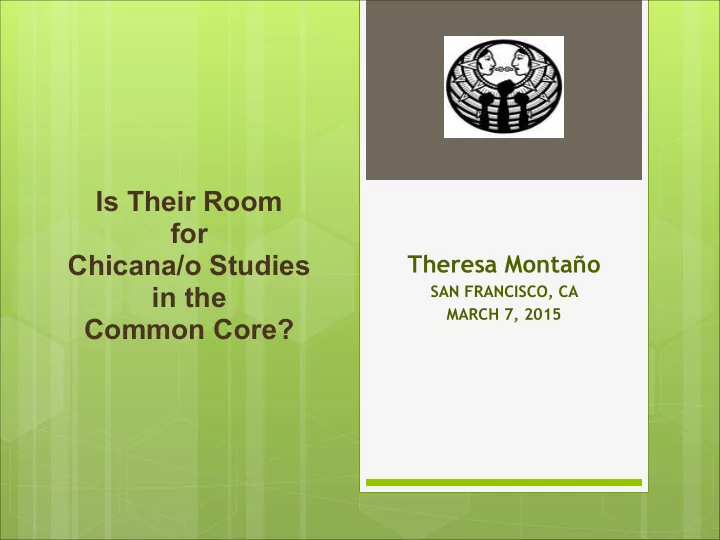

Is Their Room for Chicana/o Studies Theresa Montaño in the SAN FRANCISCO, CA MARCH 7, 2015 Common Core?
What is Chicana/o Studies? � Legitimate Academic Discipline � Multidisciplinary Study Of Chicana/Os, Mexican- American And Latino/As � Born Of Struggle � Critical Theory And Pedagogy � Contextualized � Chicana/O Studies Is For Everyone
Ethnic studies programs are always engaged in defending their existence. Christine Sleeter
What do we know about Common Core ? � Applicable to Math and English/ Language Arts � Next Generation Science Standards � References to Critical Thinking and Higher Order Thinking Skills � Hopeful End to Scripted Curriculum � NO Common Core in Social Studies and History � The present History and Social Studies Standards Are Void of Chicano/a Studies � Districts are Passing Ethnic Studies Requirement
Common Core � A major critique of curriculum mandates pre-CCSS argues that the teaching of poetry, literature, drama, and were vastly reduced (Bartolomew, 2012). � The attacks on Chicano/a Studies have been well-documented. � There is a dearth of Chicano/a Children’s literature (Valenzuela, 2014). � Bartholomew argues that the CCCS may allow for the adoption of curriculum and texts that promote “creativity, insight, adaptability, and the capacity for expansive thinking (1)”.
Chicana/o Children’s Literature � Furumoto emphasizes that Chicano/a children’s literature is “born of struggle”. � Chicano children’s literature connects to the lives of poor and working class families. � Creates opportunities for dialogue and social justice activism. � Analyzes the past and present sociopolitical realities. � Chicano Literature is the springboard by our teachers to critically analyze the policies that may (mis)inform practice.
Chicano/a Literature K-6 � Bilingual Texts � Written By And For Chicanos/As � Illustrated By And For Chicanos/As � Developmentally Appropriate � Context And Content � Message
Literature Examples � Dear Primo � America’s Story � Pepita Speaks Twice � Esmeralda Rising � Cool Salsa � Friends From the Other Side � Antonio’s Card/Tarjeta
Is Their Room for Chicana/o Studies Yes, but… in the Common Core?
Rethinking Schools (2014) ▪ Fight The Implementation Timelines ▪ Resist The Stakes and Priority Attached to the Tests ▪ Expose The Truth About the Commercial and Political Interests Shaping This False Panacea.
Two Very Different Views Deficit Asset � Untapped Cultural and Culturally and Linguistic Knowledge Linguistically Deprived � � Unrecognized Talents, Unmotivated and Potential for Growth Uninterested � � Resilient, Creative and At-risk and Remedial Persistent � � � Resister, Bicultural Negotiator Troubled � Community Engagement, Othering, Blaming Becoming an Ally
Challenging Deficit Views Cultural, Linguistic and Familial Knowledge � Familial/Household Rules (Dating, Discipline, Familial Hierarchy) � Music, Art and Culture � Family Gatherings (Birthdays, Meal time, Foods, Customs) � Family/Cultural stories (Ancestors, Role Models, Sayings, Legends) � Language (Terms, Social Language, Knowledge of Ancestral or Tribal Language) � Lessons learned (Practical and Intellectual Lessons)
Ideology Critically Compassionate Pedagogy Authentic Caring- treating students as full � and complete human beings. Critical Pedagogy- elevating students to the � status of subjects in the creation of knowledge. Social justice content-teaching content that � directly counters racism and racist stereotypes through epistemological contextualization of the students social, economic and cultural relations.
Pedagogical Practices Process � Reflection, Dialogue, Action � Problem Posing � Development of Voice � Politicizing the Everyday � Critical Literacy
Chicano/a Studies History • Language • Art • Music • Social Sciences • Health and Human Service • Community and Service • Learning
Authentic Education � � Experiential Knowledge � Culturally& Historically Responsive � Familismo: Community of learners � Social Justice Centered � Critical Consciousness � Community Service � Respect and Understanding � Indigenous epistemology � Alignment with State Standards � Social & Educational Transformation
You can’t test that…
Contexts Ethnic Studies on the Move � Struggle to Defend Ethnic Studies � Struggle to Adopt Ethnic Studies � Infuse or Stand Alone? Elective or Mandate? � Who Defines Subject Matter? � What Makes One Qualified? �
Push for the development and publication/ � adoption of texts that meet the definition. Demand that Chicano/a literature be identified � and that teachers be given time to develop curriculum. Thematic Teaching � Negotiate the text � Authorship � Local Control is key to moving Chicano/a Studies � in K-12. Move beyond Chicano/a literature and demand the � full inclusion of Chicano/a Studies. Don’t debate stand alone or infusion, required both. � Improve teacher readiness and knowledge of � Chicano/a Studies. Tap the cultural and linguistic knowledge in our � communities, document the sociopolitical realities and engage students and families in writing their own stories.
Recommend
More recommend